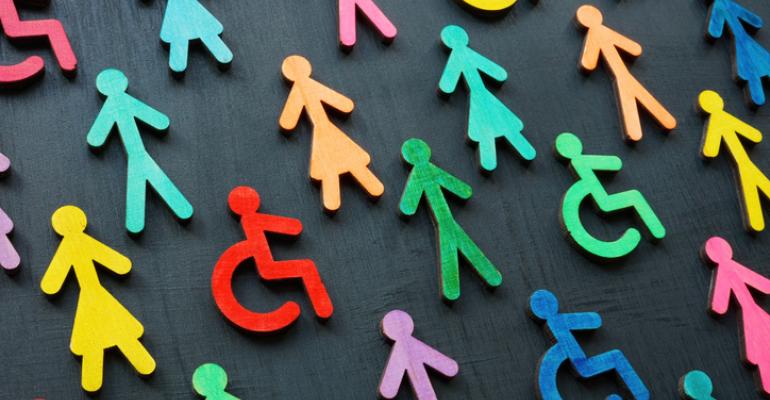In mid-December, the Event Service Professionals Association—a group of more than 500 event-service professionals who work on the property and venue side—released its Accessibility Toolkit for Venues & Destinations. The 20-page document is a free, downloadable guide intended to help hotels, convention centers, convention bureaus, and special-event venues serve meetings and events in more equitable and inclusive ways.
“Event-service professionals are the ones who find the answers that ensure a successful event for all attendees,” said Denise Reid, ESPA president and event planning manager at the Hyatt Centric French Quarter in New Orleans. “We must be at the forefront of accommodating people with varying abilities—some of which are invisible to others—and communicate options to meeting planners in advance.”
The toolkit is designed sequentially, starting from a guest’s arrival at a destination airport and moving along to ground transportation, lodging, meeting sites, and off-site venues. The guide also includes a resource list that can be customized to include local businesses who cater to event groups.
In 2018, ESPA developed its first accessibility resource, Project Access: Accessible Meetings FAQs, to help event-service professionals provide more guidance to planners. Former ESPA President Denise Suttle, CMP, fast-tracked that initiative after she and her team at Visit Albuquerque noticed an uptick in the number of questions event planners were asking about accessibility—from how many roll-in showers hotels had on property to the availability of renting large quantities of motorized scooters and wheelchairs.  The most recent toolkit touches on those areas as well as others that have come to the fore since that first resource was released. A few examples: airports, convention centers, and hotels are tasked with making sure that their escalators have audio beepers to inform visually-impaired people when the escalator is coming to an end; advice is included on offering gender-neutral bathrooms, lactation rooms, and low-sensory rooms; and properties are warned about using scented amenities in guest rooms and bathrooms that could cause bad reactions among allergic or neuro-diverse attendees.
The most recent toolkit touches on those areas as well as others that have come to the fore since that first resource was released. A few examples: airports, convention centers, and hotels are tasked with making sure that their escalators have audio beepers to inform visually-impaired people when the escalator is coming to an end; advice is included on offering gender-neutral bathrooms, lactation rooms, and low-sensory rooms; and properties are warned about using scented amenities in guest rooms and bathrooms that could cause bad reactions among allergic or neuro-diverse attendees.
Earlier in 2023, ESPA launched another downloadable guide, Diversity, Equity and Inclusion, a Guide for Event Service Professionals, to help all its hospitality members bring the spirit of inclusion to future events.
The association views the latest toolkit as an evolving document that will use real-world observations from its members to fine-tune its advice for future editions.

Attendee Accessibility and Inclusion from the Venue Side
A new toolkit for employees at hotels, convention centers, and special-event venues can provide planners with deeper perspective on what to ask during site selection.
0 comments
Hide comments




